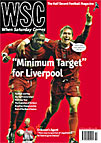 The number of Australian players in Britain has turned from trickle to flood, fuelled by an army of agents. Neil Forsyth traces this all back to a very English wheeler-dealer
The number of Australian players in Britain has turned from trickle to flood, fuelled by an army of agents. Neil Forsyth traces this all back to a very English wheeler-dealer
Ten years ago it was Scandinavians. Every United Kingdom team, it seemed, had one. Cheap, professional and highly adaptable to the British playing style (apart from Tomas Brolin, on all three counts) they streamed across the North Sea. It wasn’t a coincidental occurrence, a sudden outbreak of itchy feet. Rather, it was down to the emergence in those countries of an ambitious and inventive breed of a relatively new football phenomenon, the modern agent. Well educated, fluent in English and with a largely untapped resource to market, the fledgling Scandinavian agents found the UK a fertile market. One, Rune Hauge, brought a novel business approach to his dealings with then Arsenal manager George Graham, leading to the Scotsman’s sacking.
Today, another nation’s agents find themselves in a similar position. The last time Australia named a full-strength squad, 13 of the 19 players included hailed from UK clubs. Away from the Socceroos, Australian players are popping up throughout the British leagues, many of them emerging talent brought halfway round the world to finish their football education. Managing established players and locating and dispatching the youth is a battalion of Australian agents. Currently, there are 30 of the latter registered with FIFA, compared to Norway’s 21, Sweden’s 16 and Denmark’s 13, an amazing statistic for a country with a domestic football scene traditionally characterised by disarray. They have even produced one to match the “fame” of Rune Hauge: the irrepressible Bernie Mandic who shamelessly trousered £2 million when his client Harry Kewell skipped the sinking ship at Leeds.
One agent, Melbourne- based Lou Sticca, sees the roots of the steady influx of Australian players into British football in the influence of one man: “Terry Venables gave Australian players a respect that was taken up by many other British managers. When he took over the Socceroos in 1996, he was very quick to appreciate the qualities of Australian players, the obvious physical attributes and the single-minded approach to winning. When he returned to the UK in 1998 I think he helped to spread the word.”
Although Craig Johnston and Tony Dorigo had flown the flag in the years before Venables’ involvement, their antipodean roots were seen as a novelty. His spell in charge of the Socceroos put Australian football into the limelight and agents who were used to effectively cold-calling UK clubs found them willing, if slightly bemused, audiences. There has been a steady stream of players ever since, leaving a troubled national league behind them.
“The local scene has problems,” admits Sticca. “Soccer is the most played sport in Australia, over one million registered players in a country of 20m, well ahead of all other sports. But the strength is purely in the grass roots: the national competitions are seen as part time, poorly run and lacking in talent, though I think that is unfair. But our strength is definitely in raw talent, physically stronger than most countries, but needing the refinement of Europe.”
In the past decade this youthful produce has taken the form of Kewell, Viduka, Tiatto, Schwarzer and Emerton among others. Australian players are generally seen to have an enviable mental approach to the game. “The British leagues and Serie A are pretty much the only football that young Australians see. With the amount of Aussies in these leagues now, it’s getting close to saturation and leaves the local scene for dead. Our kids are glued to these leagues, it’s where they dream of playing, so when they arrive they have both the talent and huge desire to succeed and get a deal. They are perhaps less likely to get distracted by other factors than young British players.”
Two logistical factors also favour Australian football imports to the UK. The first is the fact that the vast majority can head for the green channel at immigration. With Australia a nation of immigrants, young players are likely to have a British, Italian or Greek heritage that can gain them a European Union passport and an immediate advantage over African or South American youth players. The second area of advantage is the ease with which they assimilate into British life, something that Sticca has encountered with his UK based players. “They get there and everyone is speaking the same lingo, driving on the same side of the road and eating the same food, basic life-style aspects that make it easy for players to fit in immediately and get on with improving their talent.”
Further EU expansion will soon dilute the first advantage but the second is unique. As long as the sport-obsessed country continues to produce players with the ability of those who have come before them, Australian agents will continue to reach first for their British contact book.
From WSC 204 February 2004. What was happening this month